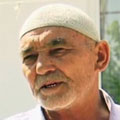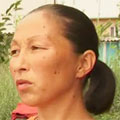The World Bank Communications Team in the Kyrgyz Republic offers this story.
Turdubai Borubayev lives amidst his grandchildren, under a grape arbor, above his flour shop just outside the city of Osh. An idyllic life, except that in June 2010 he was burned out of his house and spent a long winter living in a tent amidst the wreckage.
"We didn't know what to do then, we were scared, where to run, the house was destroyed," Turdubai Borubayev says. "But look now. These plants – we've replanted them and they're growing and all is back to normal."
Turdubai says he is grateful to the government, which helped him rebuild after a devastating three days of ethnic violence tore through Osh in 2010. The turmoil caused about $490 million dollars' worth of property damage; a huge sum, equivalent to 13 percent of the country's GDP. With budget aid from the World Bank's Economic Recovery Support Operation, the government of the Kyrgyz Republic has been helping many citizens to cope with the aftermath of the crisis.


